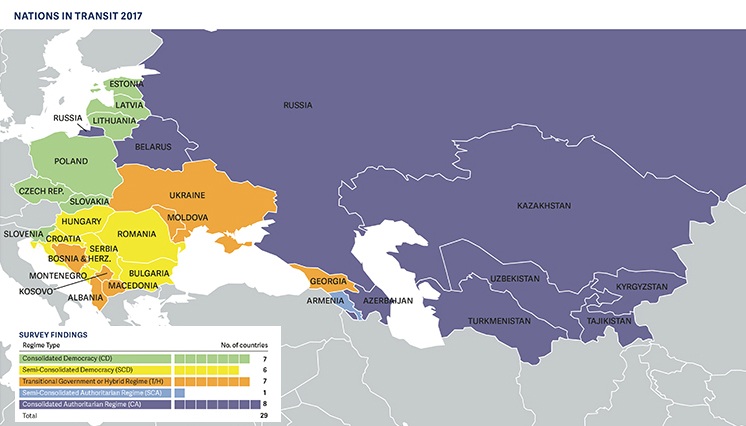
Freedom House Keeps Georgia’s Democracy Score Unchanged

Nations in Transit 2017. Photo: Freedom House
Georgia’s democracy score remained unchanged in 2016 over the previous year, according to a study by the U.S.-based rights watchdog Freedom House.
Nations in Transit 2017, a country-by-country report on progress and setbacks for democratization in 29 former communist European and Eurasian countries, covers developments of 2016.
Georgia’s overall democracy score, according to this recent survey, is 4.61, the same as it was for 2016 report, which is up from 4.64 for 2015 and 4.68 in 2014. In similar studies released by Freedom House in 2013 and 2012 Georgia’s overall score was 4.75 and 4.82, respectively.
An overall democracy score is an average of ratings for separate categories, involving electoral process; civil society; independent media; national and local governance; judiciary and corruption – scores in all these separate categories for Georgia have also remained unchanged.
The ratings are based on a scale of 1 to 7, with 1 representing the highest and 7 the lowest level of democratic progress. Country scores reflect the consensus of the organization, its academic advisers, and the authors of country reports (the author for Georgia is not listed).
Nate Schenkkan, project director of Nations in Transit, writes in an overview of the Nations in Transit 2017, that in 2016, 18 of the surveyed 29 countries suffered declines in their overall Democracy Scores, the most since the 2008 global financial instability.
“In Central and Eastern Europe and the Balkans, years of populism and corruption have eroded once-promising democratic institutions. In Eurasia, personalist authoritarianism has gone from a burgeoning trend to an entrenched norm,” he adds.
According to the report, of the 12 non-Baltic former Soviet republics, eight are “consolidated authoritarian regimes;” one – Armenia – is “semi-consolidated authoritarian regime” and the remaining three – Georgia, Moldova and Ukraine are grouped as “transitional government or hybrid regimes.”
In Baltics, Balkans and Central Europe, seven countries are grouped as “consolidated democracies” (Estonia, Latvia, Lithuania, Poland, Czech Republic, Slovakia, Slovenia); six as “semi-consolidated democracies” (Hungary, Croatia, Serbia, Montenegro, Romania, Bulgaria) and four as “transitional government or hybrid regimes” (Albania, Macedonia, Kosovo, Bosnia and Herzegovina).
This post is also available in: ქართული Русский